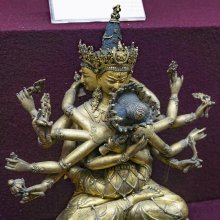Samaja, Samāja, Sāmaja, Saman-ja: 17 definitions
Introduction:
Samaja means something in Hinduism, Sanskrit, the history of ancient India, Marathi, Jainism, Prakrit, Hindi. If you want to know the exact meaning, history, etymology or English translation of this term then check out the descriptions on this page. Add your comment or reference to a book if you want to contribute to this summary article.
Samaja has 17 English definitions available.
Images (photo gallery)
Languages of India and abroad
Sanskrit dictionary
[Deutsch Wörterbuch]
Source: Cologne Digital Sanskrit Dictionaries: Böhtlingk and Roth Grosses Petersburger WörterbuchSamaja (समज):—(von aj mit sam) [Pāṇini’s acht Bücher 2, 4, 56] (vgl. [6, 2, 144).] [Vopadeva’s Grammatik 26, 171.]
1) m. a) Heerde [Pāṇini’s acht Bücher 3, 3, 69.] [Amarakoṣa 2, 5, 42.] [Hemacandra’s Abhidhānacintāmaṇi 1414.] [Medinīkoṣa j. 29.] — b) eine Gesellschaft von Thoren [Śabdaratnāvalī im Śabdakalpadruma] —
2) n. Wald [Trikāṇḍaśeṣa 2, 4, 1.] [Medinīkoṣa] — Vgl. samāja .
--- OR ---
Samāja (समाज):—(von aj mit sam) m. [Scholiast] zu [Pāṇini’s acht Bücher 2, 4, 56. 3, 3, 69. 7, 3, 60.] [Vopadeva’s Grammatik 26, 170.]
1) Versammlung, Gesellschaft [Amarakoṣa 2, 5, 42.] [Hemacandra’s Abhidhānacintāmaṇi 481. 1414.] [Halāyudha 4, 60.] [Āpastamba 1, 32, 19. fg.] [Manu’s Gesetzbuch 9, 264.] [Yājñavalkya’s Gesetzbuch 1, 84.] [Mahābhārata 1, 5321. 5698. 6972. fg. 4, 34. 7, 5445. 12, 2606.] [Rāmāyaṇa 1, 5, 14 (16 Gorresio). 2, 57, 13.] [Rāmāyaṇa Gorresio 2, 48, 21. 94, 21. 3, 42, 47.] [Spr. (II) 3626.] [CARAKA 2, 6.] [KĀM. NĪTIS. 7, 40.] [Bhāgavatapurāṇa 10, 44, 9.] [Pañcatantra 158, 7.] brahmaṇaḥ, paśupateḥ bei [Mahābhārata 4, 339.] rājñām von [Rāmāyaṇa 1, 4, 24. 5, 27, 19.] [Harivaṃśa 2912. 4434.] [Spr. (II) 7352.] [Oxforder Handschriften 79], b, [No. 136, Z. 10.] [Bhāgavatapurāṇa 4, 21, 13.] kṣitipa [Raghuvaṃśa 5, 76.] sura [9, 18.] jana [Daśakumāracarita 59, 5.] prekṣā eine zum Zuschauen versammelte Gesellschaft [Manu’s Gesetzbuch 9, 84.] dyūta [Daśakumāracarita 69, 13.] prīti [Kathāsaritsāgara 50, 113.] samājaṃ kar eine Versammlung veranstalten [Harivaṃśa 8189.] [Oxforder Handschriften.9,b,2.] mañcavāṭāḥ (so die neuere Ausg.) [Harivaṃśa 4537.] vāṭa [4538.] [Mahābhārata 1, 6960.] —
2) das Zusammentreffen mit Jmd (gen. oder im comp. vorangehend) [Bhāgavatapurāṇa 10, 60, 38.] [Varāhamihira’s Bṛhajjātaka S. 87, 17. 104, 34.] —
3) Fülle, Menge [Halāyudha 4, 1.] sukha [Gītagovinda 11, 21.] —
4) eine best. Conjunction der Planeten [Varāhamihira’s Bṛhajjātaka S. 20, 5. 7. 9.] —
5) = sāmaja Elephant [ANEKĀRTHAK. im Śabdakalpadruma] — Vgl. samaja, sāmājika .
--- OR ---
Sāmaja (सामज):—
1) adj. = sāmottha (samottha fälschlich [Hemacandra’s Anekārthasaṃgraha]) [Hemacandra’s Anekārthasaṃgraha 3, 150.] [Medinīkoṣa j. 29.] im Sāmaveda vorkommend: svara [Śiśupālavadha 12, 11.] —
2) m. Elephant [Trikāṇḍaśeṣa 2, 8, 34.] [Hemacandra’s Anekārthasaṃgraha] [Medinīkoṣa] [Hārāvalī 14.] [Śiśupālavadha 12, 11.] — Vgl. sāmayoni .
Sanskrit, also spelled संस्कृतम् (saṃskṛtam), is an ancient language of India commonly seen as the grandmother of the Indo-European language family (even English!). Closely allied with Prakrit and Pali, Sanskrit is more exhaustive in both grammar and terms and has the most extensive collection of literature in the world, greatly surpassing its sister-languages Greek and Latin.
See also (Relevant definitions)
Partial matches: Ja, Sam, Aja, Cama, Sama, Saman.
Starts with (+35): Sama Jataka, Samaajawaadee-vyavastha, Samaja-sarpa, Samajaateey, Samajadara, Samajadhishvara, Samajadhishwar, Samajadroha, Samajadrohi, Samajaghatuka, Samajaghatukate, Samajajivi, Samajaka, Samajakalyana, Samajakamtaka, Samajakamtaki, Samajako-khandatmaka-vibhajana, Samajako-shrenikrama-vibhajana, Samajam, Samajana.
Ends with (+11): Agisamaja, Amarasamaja, Arthasamaja, Aryasamaja, Asamaja, Brahmasamaja, Devasamaja, Dyutasamaja, Giriyagrasamaja, Giryagrasamaja, Golasamaja, Gosamaja, Guhyasamaja, Janasamaja, Kshamaja, Lokasamaja, Madhyavitta-samaja, Mahasamaja, Murkhasamaja, Nasamaja.
Full-text (+55): Samajika, Prekshasamaja, Dyutasamaja, Samajam, Samaya, Samaji, Samajasamniveshana, Samajya, Samodbhava, Komkara, Murkhasamaja, Naphanukasana, Satyarthaprakasa, Sukhasamaja, Prekshaka, Yadavasamaja, Shasak, Prekshak, Arthasamaja, Vyapari.
Relevant text
Search found 25 books and stories containing Samaja, Samāja, Sāmaja, Saman-ja, Sāman-ja, Sam-aja, Sam-āja, Sama-ja, Sāma-ja; (plurals include: Samajas, Samājas, Sāmajas, jas, ajas, ājas). You can also click to the full overview containing English textual excerpts. Below are direct links for the most relevant articles:
Amarakoshodghatana of Kshirasvamin (study) (by A. Yamuna Devi)
Fauna (12): Synonyms added by Kṣīrasvāmin < [Chapter 5 - Aspects of Nature]
Fauna (5): Domesticated Animals (a): Elephants < [Chapter 5 - Aspects of Nature]
Rig Veda (translation and commentary) (by H. H. Wilson)
Rig Veda 6.25.9 < [Sukta 25]
Blue Annals (deb-ther sngon-po) (by George N. Roerich)
Chapter 2 - Guhyasamāja-tantra system of Noble Nāgārjuna < [Book 7 - The preaching of the Tantras]
Chapter 2 - Guhyasamāja Marpa system < [Book 8 - The famous Dakpo Kagyü (traditions)]
Chapter 2 - Spa tshab together with his lineage < [Book 6 - The Origin of the Mādhyamika (middle way)]
Chaitanya Bhagavata (by Bhumipati Dāsa)
Verse 1.10.3 < [Chapter 10 - Marriage with Śrī Lakṣmīpriyā]
Verse 2.1.3 < [Chapter 1 - The Beginning of the Lord’s Manifestation and His Instructions on Kṛṣṇa-saṅkīrtana]
Verse 2.7.6 < [Chapter 7 - The Meeting of Gadādhara and Puṇḍarīka]
Kamashastra Discourse (Life in Ancient India) (by Nidheesh Kannan B.)
10. Erotic Culture < [Chapter 1 - Rise of Urbanization and Luxury Life in India]
4. Advent of Kāmaśāstra < [Chapter 5 - Looking for Alternatives: Possibilities in Kāmaśāstra]
7. Positioning Kāmaśāstra in the Festive Scenario of Early Urban India < [Chapter 1 - Rise of Urbanization and Luxury Life in India]
Brihat Samhita (by N. Chidambaram Iyer)
Related products

